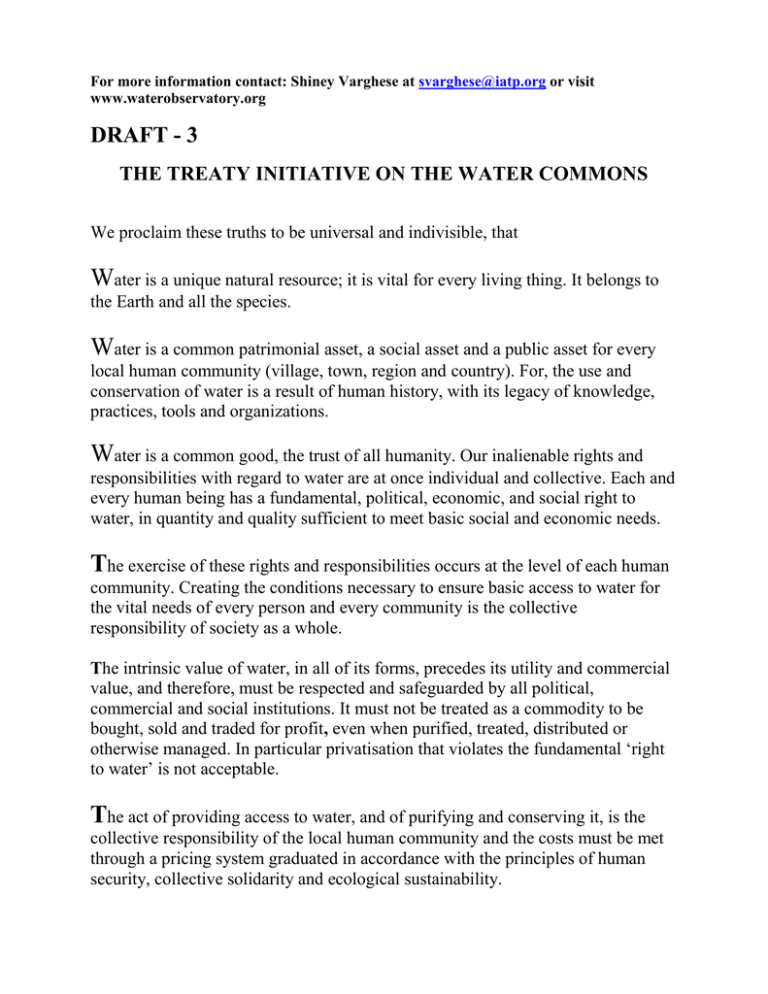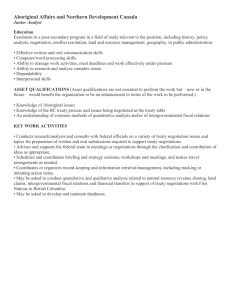W DRAFT - 3 THE TREATY INITIATIVE ON THE WATER COMMONS
advertisement

For more information contact: Shiney Varghese at svarghese@iatp.org or visit www.waterobservatory.org DRAFT - 3 THE TREATY INITIATIVE ON THE WATER COMMONS We proclaim these truths to be universal and indivisible, that Water is a unique natural resource; it is vital for every living thing. It belongs to the Earth and all the species. Water is a common patrimonial asset, a social asset and a public asset for every local human community (village, town, region and country). For, the use and conservation of water is a result of human history, with its legacy of knowledge, practices, tools and organizations. Water is a common good, the trust of all humanity. Our inalienable rights and responsibilities with regard to water are at once individual and collective. Each and every human being has a fundamental, political, economic, and social right to water, in quantity and quality sufficient to meet basic social and economic needs. The exercise of these rights and responsibilities occurs at the level of each human community. Creating the conditions necessary to ensure basic access to water for the vital needs of every person and every community is the collective responsibility of society as a whole. The intrinsic value of water, in all of its forms, precedes its utility and commercial value, and therefore, must be respected and safeguarded by all political, commercial and social institutions. It must not be treated as a commodity to be bought, sold and traded for profit, even when purified, treated, distributed or otherwise managed. In particular privatisation that violates the fundamental ‘right to water’ is not acceptable. The act of providing access to water, and of purifying and conserving it, is the collective responsibility of the local human community and the costs must be met through a pricing system graduated in accordance with the principles of human security, collective solidarity and ecological sustainability. And, Whereas, the world's finite supply of available water is being polluted, diverted, extracted and depleted so that millions of people and species are now deprived of water, and Whereas governments around the world have failed to protect their precious water legacies, Whereas, our role as trustees of this irreplaceable resource, places a special responsibility on each of us to serve as a steward on behalf of the preservation and well being of our species as well as that of all our other fellow creatures, Therefore, the peoples of the world declare the Earth's water supply to be a commons, to be protected, nurtured and judiciously managed by all peoples, communities and governments at the most local level. Governments must create an international framework to encompass this multi-tiered system. Because citizens must be at the center of any decision making process, citizen organizations will establish a World Water Parliament, to ensure that every human being has access, individually and collectively, to water in quantity and quality sufficient to meet basic social and economic needs. Furthermore, we declare that water will not be extracted, traded or exported as a commodity, and must immediately be exempted from all existing and future international and bilateral trade, investment, credit and other agreements, including credit agreements between governments and the IMF, World Bank and other multilateral banks. The Parties to the treaty - to include signatory nation states and Indigenous Peoples agree to administer the Earth's fresh waters as a trust. The signatories acknowledge the sovereign right and responsibility of all peoples to oversee the water resources within their territories and collectively determine how they are managed and shared. Note: This draft embodies the underlying principles of: The Accra Declaration, The Cochabamba Declaration, The Treaty Initiative to Share and Protect the Water Commons, The US Water Contract, The Water Manifesto by Global Water Contract, and The NGO Alternative Treaty on Fresh Water, Rio de Janeiro, June 1-15, 1992. 2




